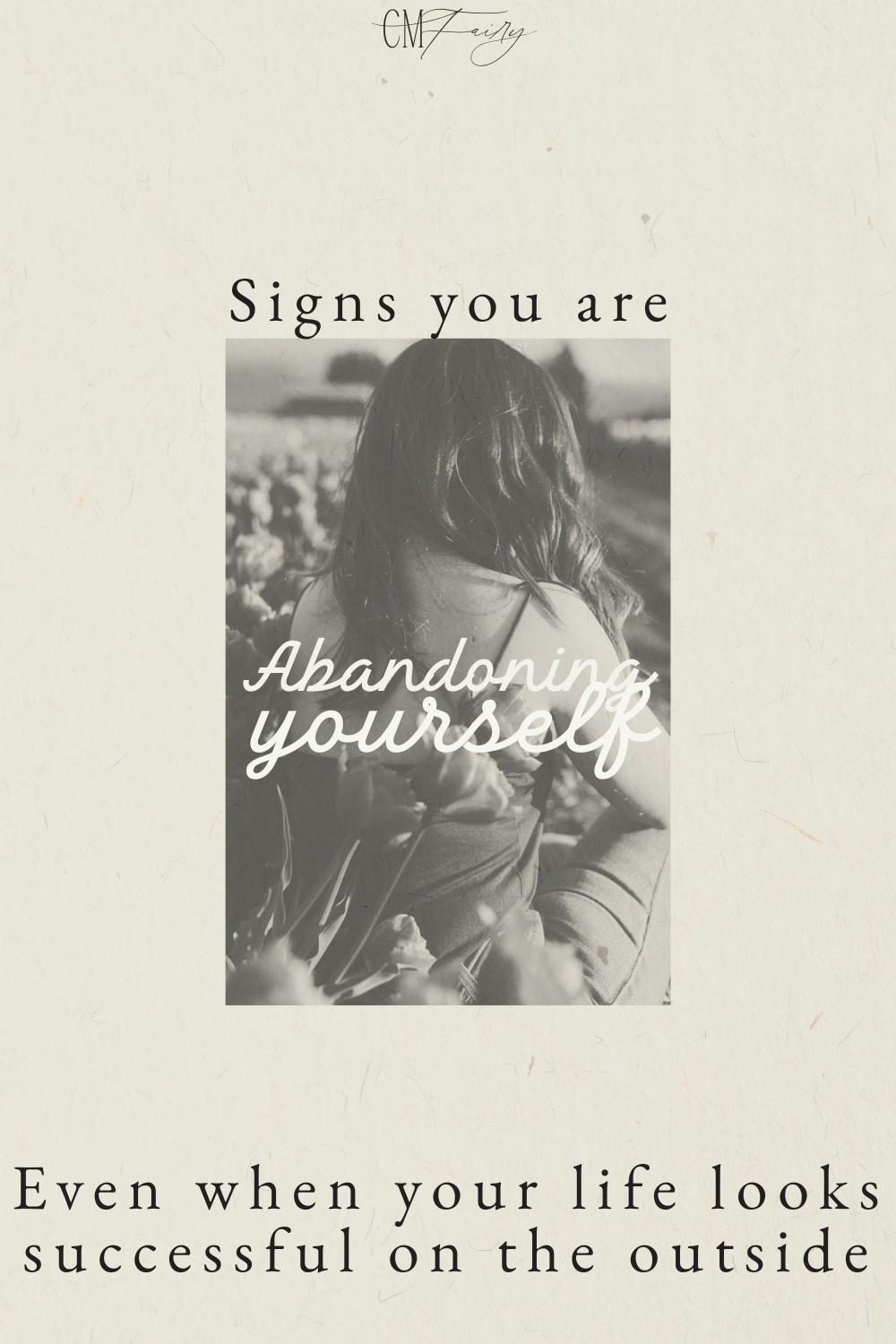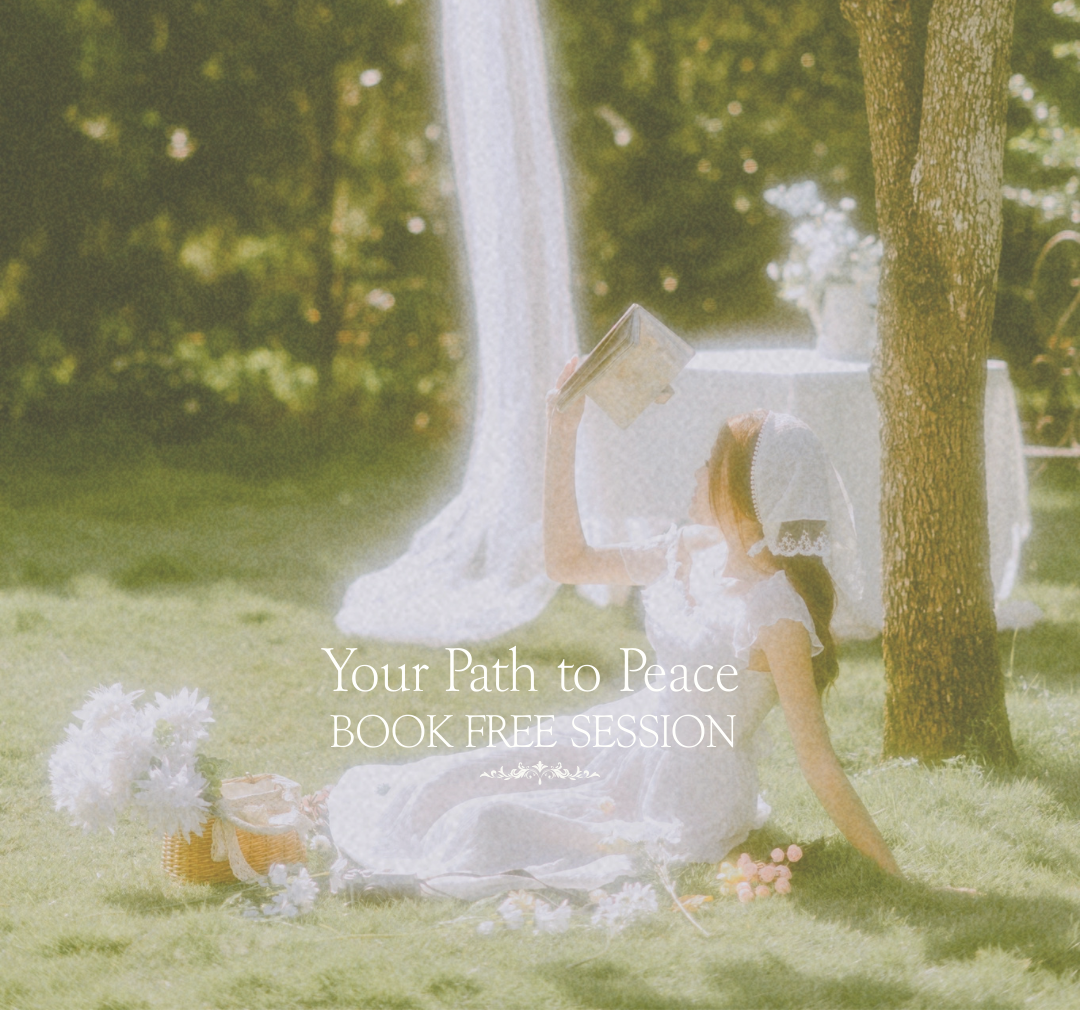Signs you are abandoning yourself (even if you look successful on the outside)
As someone who’s high-functioning—leading a business, managing a team, or excelling in your career—you’re probably the one who shows up for everyone.
If a team member drops the ball, you’re the one who catches it. If a client needs extra support, you’re there—even if it means skipping lunch or lowering your rates even though you said you wouldn’t. If your partner says he needs space, you give it, even when your own heart is aching for closeness. If a friend wants to process her heartbreak, you listen—without ever mentioning the loneliness you’re feeling inside.
And maybe… it is second nature. Because you’ve always been this way. You’re the one people trust. The capable one. The calm, grounded one. The generous one. The one who holds it all together.
Until—quietly—you start to feel like you’re falling apart.
And this “falling apart” doesn’t always come all-at-once, with a drama. Sometimes it shows up as a quiet ache… a subtle feeling that feels like nobody cares about you, as much as you do for others.
Or it looks like holding your breath through another Zoom meeting, wondering if others will ever recognize the load that you’ve been carrying for so long.
Or sitting in your beautifully decorated living room after a full day of client wins and inbox zero… only to feel disconnected from the life you’ve worked so hard for.
Or fantasizing about canceling everything on your calendar, not because you’re lazy, but because you don’t remember the last time you felt truly held.
And from my own experience — and from the women I’ve had the honor to support — I see how common this feeling of abandonment really is. It’s just that we don’t often see it reflected out there, because it’s only felt behind the scenes. And worse, when you have a life that looks good on the outside… when in the eyes of others, you appear to have it all together… this inner ache can feel even more isolating.
Yet when your soul is feeling it, you can’t deny it anymore.
And this pain of feeling abandoned (i.e. the abandonment wound) can look like:
Relationships feel one-sided
You give… and give… and give.
Your time, your presence, your emotional energy. You’re the friend who remembers her best friend's launch date, sends voice notes of encouragement, makes space for late-night vent sessions. You’re the partner who anticipates needs before they’re spoken. You’re the one who remembers birthdays, holds space, asks the deep questions, makes the thoughtful gestures.
But when it’s your turn? Crickets.
So you try to express how you feel—but maybe your words fall flat, or get deflected, or are met with silence. Maybe the other person "hears" you, but nothing changes. Maybe you start wondering: Am I asking for too much? Am I being too sensitive? So you may shrink. Or you stop asking. You convince yourself you’re fine.
And yet, the howling heart grows louder. And you may find yourself crying in the bathroom after brunch. Or smile through a FaceTime call and then feel a wave of emptiness when you hang up. Or start to feel like a ghost, being unvalued or ignored in your own relationships.
And my love, that is not a sign that you’re broken. It’s just a sign that you’ve been abandoning yourself—by consistently putting everyone else’s needs above your own, even when your heart is screaming to be seen, heard, and understood. And be released from the abandonment wound.
Your work feels draining (even when you’re good at it)
When you’ve abandoned yourself, you may find yourself pouring all your time, energy, and effort into your work. The projects, the clients, the marketing, the deliverables.
But even then… it never quite feels like enough. You may feel like your work isn’t truly seen or valued by your boss, your coworkers, your clients, or your prospects.
And even when they do seem to value it—when you’re getting the daily sales in your business or the positive feedback at work—it still feels like a grudge to show up. While being hit by the overwhelm of having to do it all again tomorrow.
And you may find that you’re not as excited or driven as you used to be—now all you feel is this quiet flatness, like you’re going through the motions, getting things done just for the sake of it. Your drive can feel like you’re watering a dead plant, hoping it’ll somehow bloom again.
And sometimes, it feels like life is just… passing you by. It’s like you’re watching yourself from the outside, ticking boxes but never actually feeling alive in any of it.
My dear one, if you’ve felt any of this, again, please know it’s not because you’re doing things “wrong.” It stems from something so simple, yet so tender: the abandonment wound. Especially if you’ve spent your whole life being the career-oriented one, the achievement-minded one, the woman who excels, performs, and delivers… but now you’re reaching a turning point. A place where your soul is softly but fiercely saying: “I don’t want to be on the back burner anymore.”
You find yourself trying to numb it all
When you’re secretly abandoning yourself, you feel tired but you may not call it burnout. Because you still show up. You still perform.
Yet, when the work ends, a hollowness may creep in… and you may feel the urge to numb it all together… as in scrolling past the instagram feed just to escape your thoughts for a moment. Or like reaching for snacks you’re not hungry for. Or like watching four episodes of a show just to feel something inside.
Or maybe you catch yourself working late—not out of necessity, but because stopping would mean facing the emptiness you feel. Or maybe you find yourself over-planning, over-perfecting, micromanaging every detail—because deep down, you don’t feel good in simply being.
Again, these are all signs of self-abandonment, my dear. We feel the urge to run away from our feelings, especially when they say “I feel abandoned.”
How abandoning myself showed up for me
In fact, I’ve felt all the things I’ve mentioned earlier. On the outside, it looked like I had it all together. I was a PhD student on a full-ride scholarship. I was the pretty girl on Instagram, posting dreamy images about how I had a thriving business and a life full of freedom. But inside… I was quietly suffering.
Underneath the work output I was producing, I felt like no one actually liked me—not even my mentor, nor the friends from my team. I’d overhear them saying things about me behind my back, and yet… I was too afraid to show who I really was.
And online… when no one was watching… when I wasn’t busy with clients or uploading a carefully curated post… I’d sit there with this howling emptiness in my chest. A restless ache that whispered: “You’re not there yet. You can’t rest yet. Peace is still far away.”
And it didn’t hit me all at once that I was abandoning myself. Not until I experienced the sting of being unreciprocated by a dear friend I had loved so deeply. She gave me just a fraction of the love and care I had so willingly poured into her… and that moment cracked something open in me.
I realized how much it all came from me—from being so used to putting everyone else’s needs, and the #goals I was chasing, above my own heart. From trying to fit into the world’s demands and expectations… and losing my connection to myself in the process.
And from that, of course, came the feelings: being unloved, uncared for, unimportant… therefore the ache that screams “I feel abandoned.”
The way to come home to yourself: How to not abandon yourself anymore
To no longer abandon yourself, and therefore heal the abandonment wound—is to come into the realization that the life-force inside of you is more important than anything else. This is the inner foundation experiencing a fulfilling life that doesn’t just look good but actually feels good
Yes, more than your career, more than the accolades, more than the performance you’ve kept up so gracefully all this time. It doesn’t mean you’re selfish for putting yourself first. In fact, it’s the opposite—because only when you are full, truly full from within, can you give to others from a place of overflow rather than depletion.
You cannot give your best to the world from an empty tank. You cannot serve from a well that has run dry. So your first devotion, before the meetings, before the deadlines, before the emotional labor you so generously offer others—must be to you.
Giving to you. Loving to you. Being kind to you. Caring about you. Honoring you.
And the beauty is: when you pour into your own heart first, you stop “trying” to get others to meet you the same way. You no longer hustle for love or scramble for scraps of validation. Instead, you become the one who decides. If your body says no, you trust it. If your joy leads you elsewhere, you follow it. If your intuition whispers “this isn’t right,” you don’t override it for the sake of being agreeable.
So in your relationships, this might look like offering yourself the kind of tenderness you’ve longed for from others—so that when you go on a date, or spend time with friends, you’re not anxiously calculating your every move. You’re simply being. You’re relaxed. Receptive. Rooted in your own enoughness.
It might look like trusting your inner knowing, so that when something feels off in a relationship—even if it’s subtle—you don’t gaslight yourself or talk yourself out of it. You listen. You honor what you feel. You stop settling.
And in your business or career? Not abandoning yourself may look like choosing to write from your soul instead of chasing engagement metrics. It may look like acknowledging your fatigue instead of forcing another launch. It may look like allowing your creativity to guide your strategy, not the algorithm. Or it may mean restructuring your days so that they nourish your nervous system instead of constantly pushing it into overdrive.
It might mean redefining what success means to you, even if that definition looks nothing like the one the world applauds.
Coming home to yourself will look different for everyone. But the common thread in all of it is this: choosing, again and again, to return to the Self you’ve been avoiding. The quiet Self beneath the roles. The honest Self beneath the performance. The radiant, soulful Self that’s always been waiting.
Because it is that Self—your truest essence—that completes you, nourishes you, fulfills you. That is the seat of your wholeness. Some call it God. Some call it Source. Others, the Divine.
But whatever you call it—it’s not out there. It’s in you. And it’s calling you home.
A question to begin connecting to that is to ask:
Which parts of me are feeling abandoned? And how would it feel to return to them?
And my love, this is how your most alive, peaceful, fulfilled life—the one you’ve been secretly longing for all this time—will begin to unfold.
Not by striving. Not by fixing. But by returning to You that has never left.



Book a free intro session to see the transformation your soul is guiding you into ❀